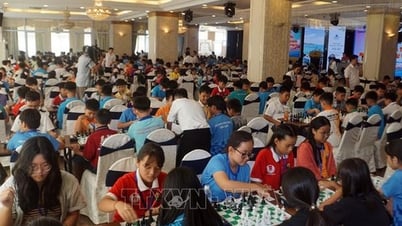On August 4, E Hospital reported the case of a young man who suffered cardiac arrest while working out at the gym and was saved.
Previously, at around 2:50 p.m. on July 29, the young male patient was taken by ambulance 115 to the Emergency Department, E Hospital in a Glasgow 5-point coma, with dilated pupils...
According to medical records, at noon that same day, while the 20-year-old man was working out at the gym, he suddenly collapsed and lost consciousness. Gym staff performed CPR and called 115 for emergency help.
After 15 minutes, the 115 emergency staff arrived at the scene and continued to perform CPR and defibrillation 3 times on the victim, and the heart started beating again. The patient was immediately transferred to the Emergency Department, Hospital E.
As soon as the 115 emergency call was notified that a 20-year-old patient had suffered a cardiac arrest and needed emergency care, E Hospital activated the “red alert” procedure throughout the hospital with the participation of many doctors from many specialties such as emergency, cardiology, intensive care... gathered at the Emergency Department, ready to receive the patient.

Male patient was saved after cardiac arrest at the gym (Photo: Thanh Xuan).
Dr. Nguyen Thi Ly - Department of Internal Medicine Intensive Care and Anti-Poisoning - said that, assessing this as a serious patient with a poor prognosis, the doctors continued to actively resuscitate the patient and prescribed hypothermia techniques.
"During the procedure, the patient was still in a coma, on a ventilator, and was closely monitored according to the hypothermia treatment protocol. After 3 days of completing the treatment, the patient's consciousness improved and he no longer needed to use vasopressors, could breathe on his own, and the endotracheal tube could be removed," said Dr. Ly.
Command hypothermia is a method of using cooling techniques to control the patient's body temperature to a low level (from 32°C to 36°C depending on the specific case).
Hypothermia helps reduce cell metabolism, reduce oxygen consumption, stabilize nerve cell membranes, limit brain edema, inhibit inflammatory reactions and reduce the production of free radicals to protect the brain and organ tissues.
"For the technique to be most effective, first aid for cardiac arrest at the scene is extremely important. Fortunately, this patient received emergency care early, the time of cardiac arrest before being admitted to the hospital was short, and cardiopulmonary resuscitation was immediate, so the patient recovered relatively well," Dr. Ly informed.
According to Dr. Vu Van Ba - Department of Adult Cardiology, Cardiovascular Center, E Hospital, the male patient is likely to have a dangerous ventricular arrhythmia causing sudden cardiac arrest.
A dangerous arrhythmia that causes cardiac arrest commonly found in young men is idiopathic ventricular fibrillation. This is an arrhythmia that occurs in patients with cardiac arrest without a clear cause of heart structure, coronary artery disease or metabolic disease after completing all tests and diagnostic imaging.
Although it is called "idiopathic", medical practice has identified a number of underlying mechanisms and factors involved.
Dr. Vu Van Ba added that some dangerous arrhythmias, although they have no symptoms beforehand, are the cause of cardiac arrest, such as Brugada syndrome, long QT syndrome, early repolarization syndrome, or right ventricular cardiomyopathy... This is a group of diseases mainly related to genetic abnormalities, which can only be detected early through cardiovascular screening...
Doctors advise that sudden cardiac arrest can occur at any age and in any gender.
Therefore, each person needs to exercise appropriately, not too hard. It is necessary to maintain a healthy lifestyle, avoid stress, and have a suitable diet. In particular, when there are signs of chest pain lasting more than 10-15 minutes, absolutely do not be subjective, need to see a doctor soon.
Source: https://dantri.com.vn/suc-khoe/nam-thanh-nien-20-tuoi-o-ha-noi-ngung-tim-khi-tap-gym-20250804074725525.htm






















































![[Maritime News] Two Evergreen ships in a row: More than 50 containers fell into the sea](https://vphoto.vietnam.vn/thumb/402x226/vietnam/resource/IMAGE/2025/8/4/7c4aab5ced9d4b0e893092ffc2be8327)











































Comment (0)